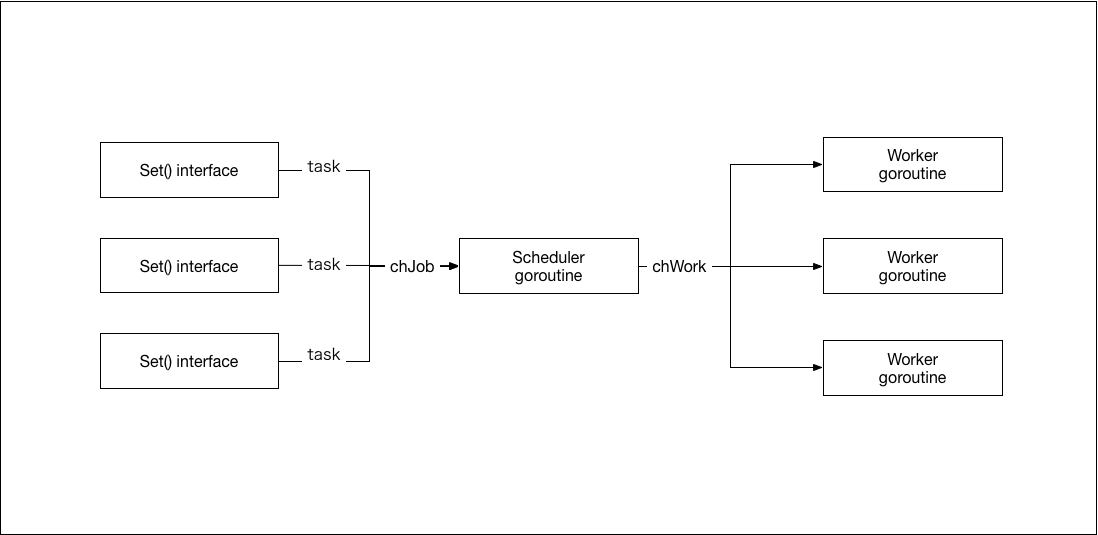High Scalable In-memory task scheduler using Min Heap implemented in Golang.
htask creates only 1 (scheduler) + n (worker) goroutines, NOT creating goroutines for each task.
if workers size == 0 then scheduler create goroutine for each task when timer have expired.
github.com/kawasin73/htask/cron is wrapper of htask.Scheduler, cron implementation with human friendly interface.
Japanese blog -> Goでスケーラブルなスケジューラを書いた
go get github.com/kawasin73/htaskpackage main
import (
"fmt"
"sync"
"time"
"github.com/kawasin73/htask/cron"
)
func main() {
var wg sync.WaitGroup
workers := 1
c := cron.NewCron(&wg, cron.Option{
Workers: workers,
})
task := func() {
fmt.Println("hello world")
}
// executed every 10:11 AM.
c.Every(1).Day().At(10, 11).Run(task)
// task will be executed in every 1 minute from now.
c.Every(1).Minute().Run(task)
tenSecondsLater := time.Now().Add(10 * time.Second)
// executed in every 2 seconds started from 10 seconds later.
cancel, err := c.Every(2).Second().From(tenSecondsLater).Run(task)
if err != nil {
// handle error
}
// cron can schedule one time task.
c.Once(tenSecondsLater.Add(time.Minute)).Run(func() {
// task can be cancelled.
cancel()
})
c.ChangeWorkers(0)
time.Sleep(3 * time.Second)
// on shutdown all queued task will be discarded.
c.Close()
wg.Wait()
}package main
import (
"context"
"fmt"
"sync"
"time"
"github.com/kawasin73/htask"
)
func main() {
var wg sync.WaitGroup
workers := 1
scheduler := htask.NewScheduler(&wg, workers)
ctx, _ := context.WithCancel(context.Background())
scheduler.Set(ctx.Done(), time.Now().Add(time.Second*2), func(t time.Time) {
fmt.Println("later executed at :", t)
})
scheduler.Set(ctx.Done(), time.Now().Add(time.Second), func(t time.Time) {
fmt.Println("first executed at :", t)
// it can set to scheduler while executing task.
scheduler.Set(ctx.Done(), time.Now().Add(time.Millisecond*500), func(t time.Time) {
fmt.Println("second executed at :", t)
})
})
scheduler.ChangeWorkers(10)
time.Sleep(3 * time.Second)
// on shutdown
scheduler.Close()
wg.Wait()
}Scheduler Interface
func NewScheduler(wg *sync.WaitGroup, workers int) *Schedulerfunc (s *Scheduler) Set(chCancel <-chan struct{}, t time.Time, task func(time.Time)) errorfunc (s *Scheduler) ChangeWorkers(workers int) errorfunc (s *Scheduler) Close() error
- min heap have no limit size.
- when scheduler is closed, all pending tasks will be discarded.
# using benchstat
go get -u golang.org/x/perf/cmd/benchstat
# benchmark Scheduler.Set()
go test -bench=. -count=10 > bench.txt && benchstat bench.txt
# benchmark latency
go run cmd/latency/main.go -interval=1000000 -n 10000 -worker=0
$ go run cmd/latency/main.go -interval=1000 -n 1000000 -worker=0
set 1000000 tasks in 2.995069909s. interval = 1µs, total=1s, workers=0
all task have executed in 1.187109126s.
task executed latency : mean=89.401961ms, min=825.441µs, max=187.529808ms
executed min index=0, max index=995060
$ go run cmd/latency/main.go -interval=100000 -n 100000 -worker=0
set 100000 tasks in 292.649906ms. interval = 100µs, total=10s, workers=0
all task have executed in 9.99992153s.
task executed latency : mean=27.207µs, min=12.938µs, max=1.195354ms
executed min index=74683, max index=0
$ go run cmd/latency/main.go -interval=1000000 -n 10000 -worker=0
set 10000 tasks in 28.64034ms. interval = 1ms, total=10s, workers=0
all task have executed in 9.999248894s.
task executed latency : mean=270.313µs, min=30.631µs, max=5.821627ms
executed min index=9118, max index=6563
MIT
